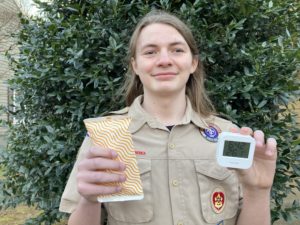My name is Russell and I am a tenth grade student. I’m a Life Scout with Troop 1577 in Herndon. My science fair project this year was inspired by Scouting and my project won second place for my school.
My project was about DIY refrigerants. I tested which materials keep food cold the longest.
 I got this idea from working on my Cooking, Hiking and Backpacking merit badges. For those badges, we learn about keeping food safe when you are outside for a long period of time. While the safest option might be dehydrated foods, I like to eat non-dehydrated foods like cheese. I wanted to know which refrigerants might work best for the longest period of time.
I got this idea from working on my Cooking, Hiking and Backpacking merit badges. For those badges, we learn about keeping food safe when you are outside for a long period of time. While the safest option might be dehydrated foods, I like to eat non-dehydrated foods like cheese. I wanted to know which refrigerants might work best for the longest period of time.
For the experiment, I bought a wireless thermometer and put it in a Styrofoam cooler. I put different refrigerants in the cooler with the thermometer and monitored the temperature. It was important to use a wireless thermometer so I would not open the cooler and impact the temperature.
The refrigerants that I tested were:
- 330 mL of water, 170 mL of rubbing alcohol, 125 mL of salt (the salt dissolved and did not increase the volume)
- 500 mL of dish soap
- Two plastic sponges in water with 500 mL of water
- Commercial ice packs
- Control = 500 mL water
I got the ideas for these refrigerants by reading blog articles by backpackers. I also researched the concept of “phase change,” meaning materials that release or absorb energy and provide useful heat or cooling.
What were the results? The frozen sponge refrigerant maintained the lowest temperature for the longest time, although the control (water) and commercial ice packs performed similarly.
However, for my next hiking trip, I won’t freeze sponges. I will just use frozen water. Then I can drink it and not have to carry sponges. But I definitely won’t bring commercial ice packs which add a lot of weight to my pack.
So when you work on these badges, you can show your merit badge counselors this information, and use frozen water to keep your food cold as well.

